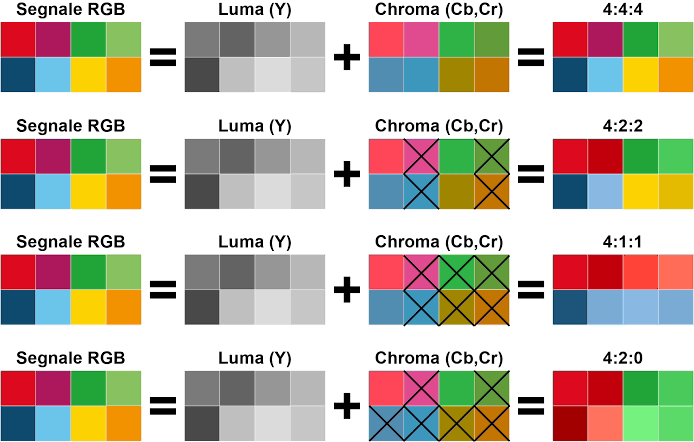Color Grading Theory | Introduction
Visual that looks pleasing to the eye does not necessarily mean that they have sufficient chroma and luminance information needed for the right color correction process. Codec makes a file smaller because that codec generally discards useless information. For instance, information about chroma red and blue.
H264 that’s already been compressed into a smaller
file can be uploaded and downloaded quickly. Despite looking just fine to the
eye, it won’t provide as much discretion as the RAW files when grading. That happens
because it contains only information of the colors displayed, so any adjustment
made to the color would mess up the picture.
Chroma Subsampling: compression of exposure and color
information (can be seen in metadata).
§ Luminance (Y): represents information about exposure/dark and
light.
§ Chroma Red: represents information about the colors
red and green.
§ Chroma Blue: represents information about the colors blue
and yellow.
(eg. the highest magnitude that has no compression =
4:4:4, meaning that there is no chroma subsampling performed by certain codecs)
Magnitude 4:2:0 or 4:0:0 = only retains information about luma and some red
color while other information is discarded to reduce the file, so that the
image remains good but only for the eyes. (For example: 8bit 4:2:0 might be
good for Youtube, but not for cinema).
Why is the number 4 preserved? According to research, the human eye is more
sensitive to changes in exposure from one shot to another than to changes in
color. So, if a file has to be compressed into a smaller file which can be
played anywhere and streamed smoothly, then the color information is to be
sacrificed.
*The more expensive a camera is, the more likely it is
to produce RAW files. Thus, the file becomes much larger because nothing is
compressed. However, CF/SD card based cameras are unlikely to produce 4:4:4
because they generally require a minimum of SSD. Footage other than RAW / 4:4:4
cannot be upgraded to have the same complete color information as RAW. Just as capturing
a low-quality photo with a 4K camera, the image will still be of low quality.

Comments
Post a Comment